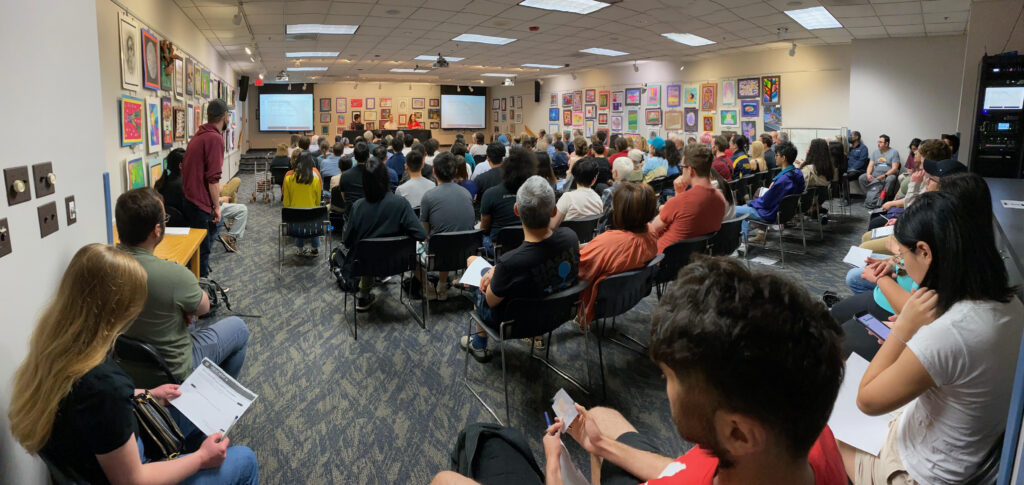Friday Night AI event addresses public’s concerns surrounding ChatGPT

On Friday, May 12, the Michigan AI Lab in the Computer Science and Engineering Division hosted an event as part of its Friday Night AI series, which aims to provide a forum for the public to learn about and discuss the latest developments in artificial intelligence. The event, held at the downtown location of the Ann Arbor District Library and drawing a crowd of over 125 members of the public, focused specifically on ChatGPT, how it functions, and its broader implications. Rada Mihalcea, the Janice M. Jenkins Collegiate Professor of Computer Science and Engineering and Director of the AI Lab, served as moderator of the event, with invited speaker Professor Dallas Card of the School of Information.
A key feature of the event was an interactive activity run by CSE PhD student Naihao Deng, during which he asked members of the audience to fill in blanks in basic sentences, and then showed how language models like ChatGPT complete similar functions.
As Deng described at the event, language models such as ChatGPT compile, or read, a vast amount of sentences written by humans from various sources and choose the most probable tokens to fill in those blanks. These models also rely on context and previously generated terms to determine which text to use, a process known as auto-regressive generation. As Deng puts it, “if a sentence was well-known and recognized by the audience, they easily reached a consensus of what should be ‘generated’ or filled in the blank. In contrast, if there was no context, the audience came up with various ways of ‘generating’ the text,” which is similar to how models like ChatGPT choose which text to generate.
This event not only enabled the audience to understand how ChatGPT and similar models function; it also provided a forum for the public to express and seek answers to their questions and concerns surrounding ChatGPT and other AI technologies.
Questions from attendees at the event reflected many ongoing research questions in the field of AI, including “the impact ChatGPT has on copyright issues, and how ChatGPT could be used to produce highly deceptive misinformation,” as Deng describes. The audience also brought up higher-level questions surrounding the cognitive abilities, or “consciousness,” of such language models.
Deng concedes that “there is no definite answer yet,” but emphasizes that it is important for the general public to have an opportunity to express their concerns and hear from experts in the field about the future of this technology. According to Deng, “As ChatGPT becomes so popular and has the potential to change various aspects of our lives, we need to find a way to live with it. There were lots of concerns, which is quite understandable, as we need some time to process the new technology and its impact.”
Additional information about Friday Night AI and future events in the series can be found on the Michigan AI website. If you are interested in attending the next Friday Night AI event, you can sign up here (scroll to the bottom).